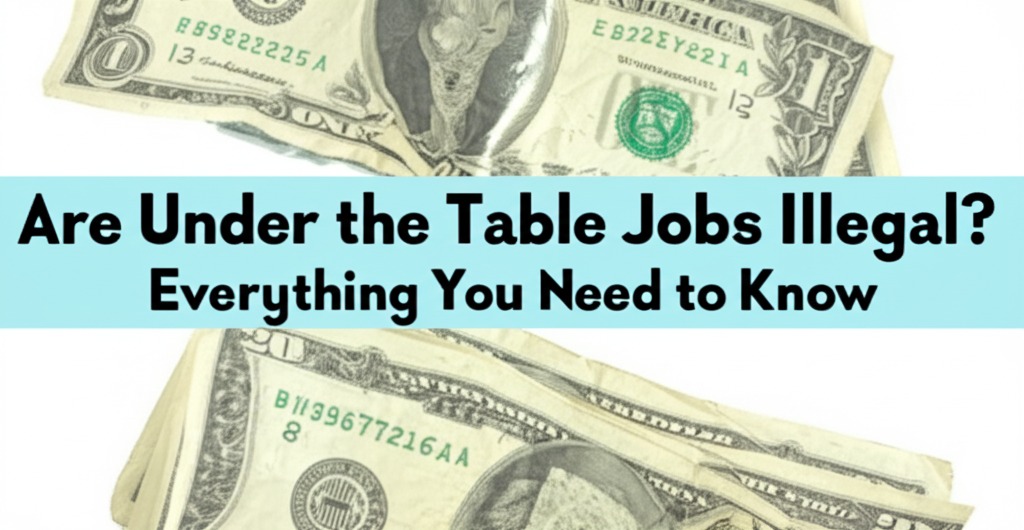
In today’s gig economy, it’s not uncommon to hear the phrase “under the table jobs” tossed around. From cash-in-hand babysitting gigs to side hustles like yard work or house cleaning, many people consider these arrangements a convenient way to earn extra income. But are under the table jobs illegal?
This article explores the legality of these types of jobs, what risks are involved, and what both workers and employers need to know to stay on the right side of the law.
What Are Under the Table Jobs?
Under the table jobs, also known as “off-the-books” employment, are jobs where workers are paid in cash and the income is not reported to the government. This typically means:
- No taxes are withheld
- No official employment record exists
- No benefits or worker protections are provided
These arrangements are appealing because they often involve faster payment, fewer formalities, and sometimes higher take-home pay. However, the legality of such jobs is more complex than it may seem.
Is It Illegal to Work Under the Table?
Yes — In Most Cases, It Is
Working under the table becomes illegal when the income is not reported to the IRS or relevant tax authorities. Here’s why:
- Tax Evasion: Both the employer and employee are required by law to report income and pay taxes. Failing to do so is considered tax evasion, which is a federal offense.
- Violation of Labor Laws: Employers are required to comply with minimum wage, overtime, and employment law regulations, all of which are sidestepped in under-the-table arrangements.
- Unemployment & Workers’ Compensation Fraud: If a worker receives benefits while working under the table, it can lead to criminal charges.
⚠️ Important: Even if you’re paid in cash, you’re still responsible for reporting that income on your tax return.
Why Do People Choose Under the Table Jobs?
Despite the risks, under the table work continues to be popular. Common reasons include:
- Lack of legal work authorization
- Quick cash with no paperwork
- Temporary or seasonal work
- Avoiding wage garnishment or child support
While these might seem like good reasons in the short term, the long-term consequences can be severe.
Risks of Working Under the Table
Working off the books comes with significant downsides. Here’s what you need to consider:
1. Lack of Legal Protections
Without formal employment, workers typically miss out on:
- Minimum wage guarantees
- Overtime pay
- Workers’ compensation
- Unemployment benefits
- Health insurance
If you get hurt or mistreated, you may have no legal recourse.
2. Difficulty Proving Income
Need to apply for a loan, rent an apartment, or file for child support? Without documented income, it can be:
- Hard to prove financial stability
- Impossible to build credit
- Difficult to qualify for public benefits
3. Tax Penalties and Legal Trouble
If caught, you (and your employer) could face:
- Back taxes with interest
- IRS penalties
- Criminal charges
- Fines or jail time for repeated offenses
Are Employers Liable Too?
Absolutely. Employers who pay workers under the table are breaking the law in several ways:
- Failing to withhold payroll taxes (Social Security, Medicare)
- Not paying unemployment insurance
- Skipping workers’ compensation contributions
- Misclassifying employees
Penalties for employers can include:
- Heavy IRS fines
- Audits
- Civil lawsuits
- Criminal prosecution
In some states, employers can even lose their business license.
What Are the Legal Alternatives?
If you’re looking for flexibility and fast cash, there are still legal alternatives to working under the table:
1. Freelancing with a 1099
Self-employed workers can legally:
- Accept cash payments
- Work on flexible contracts
- Deduct business expenses
Just make sure to track your income and file the appropriate tax forms (usually a 1099-NEC).
2. Gigs Through Apps and Platforms
Platforms like:
- TaskRabbit
- Uber or Lyft
- Fiverr
- Rover
…offer flexible work with proper tax reporting, reducing legal risk.
3. Part-time or Temporary Work
Seasonal jobs, hospitality gigs, or on-demand work can offer legit income and sometimes benefits — all above board.
What If You’ve Already Worked Under the Table?
Don’t panic — but take action to correct the situation:
- Report your income: Use Form 1040 and declare your earnings, even if your employer didn’t report them.
- Talk to a tax professional: They can help you avoid penalties and get caught up.
- Start keeping records: Document hours worked, payments received, and any correspondence.
Coming clean is usually better than getting caught later.
Conclusion: Play It Safe, Stay Legal
While working under the table might seem convenient, the legal and financial risks make it a bad idea for both workers and employers. From lack of protections to potential jail time, it’s simply not worth it.
If you’re looking for flexible income, there are plenty of legal paths that offer the same benefits — without the stress.

Andre Cuevas provides career insights, job search strategies, and professional advice to help individuals navigate the job market and achieve their career goals.






